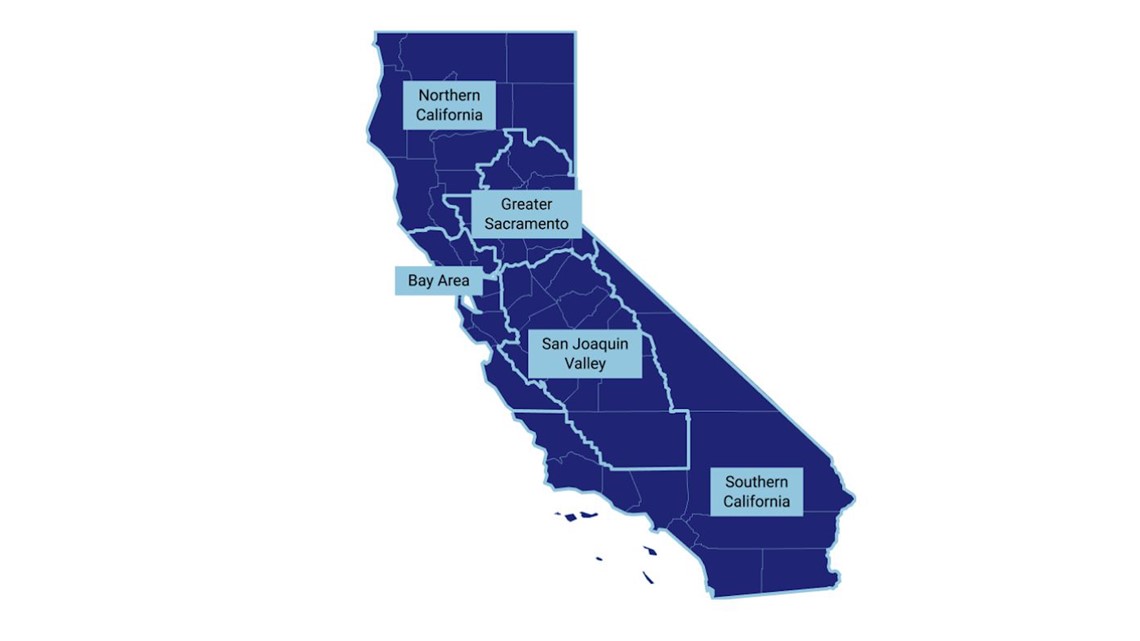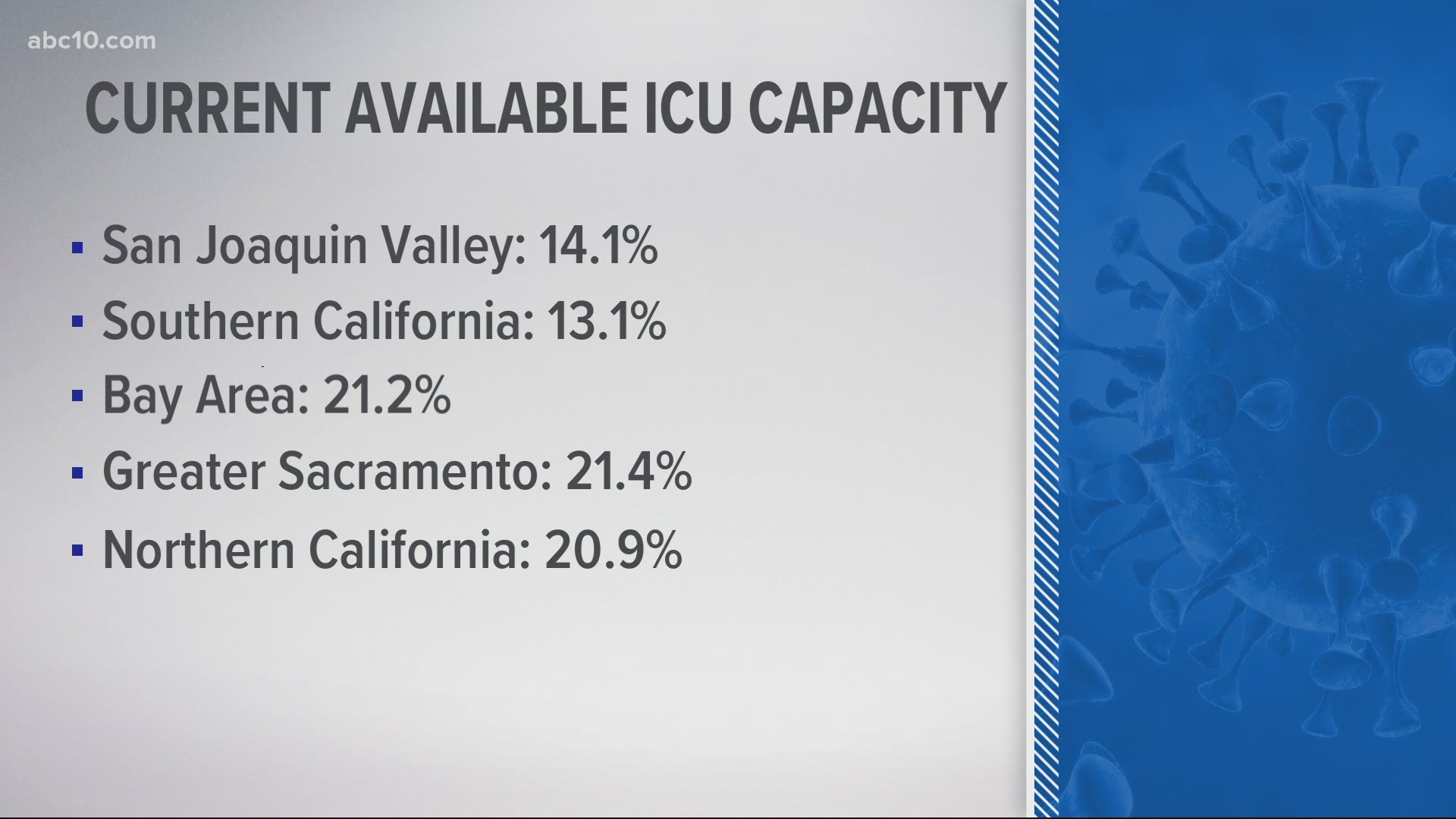CALIFORNIA, USA — Two of the state's five regions are headed for new stay-at-home orders after available ICU capacity dropped below 15%.
Gov. Gavin Newsom announced that all retail and essential operations will close in regions of California that fell below 15% capacity. The order will last at least three weeks.
San Joaquin, Merced, Tuolumne and Stanislaus are among the counties that are impacted by the new health orders.
San Joaquin County Public Health Officer Dr. Maggie Park said in a news release that health officials understand people are tired of the stay-at-home orders.
"They are the only weapons we have to combat the virus," Now, more than ever, we need San Joaquin Valley residents to step up to take these actions seriously."
Mike Whirlow, the owner of Whirlow said he has been struggling to keep his business afloat during the pandemic. He wonders why restaurants have to pay the price when health officials said the majority of positive coronavirus cases come from gatherings.
"It's cost us thousands and thousands and thousands of dollars," Whirlow said. "Each business, in order to re-invent and recreate and we've done it and we've stayed afloat but every time a new mandate comes down, it just makes it that much more difficult, that much more impossible."
San Joaquin County Office of Emergency Services Spokesperson Tiffany Heyer said the county had no other choice but to implement the new health order.
"[Businesses] have done everything that we've asked of them of this point and we are incredibly appreciative of it and unfortunately because our numbers have gone back up, we have to take this extra step and take this extra precaution," Heyer said.
Both the San Joaquin Valley and Southern California regions dropped below the levels on Friday night, according to new numbers published on the state's coronavirus website. Here's each region's available ICU capacity as of December 6:
- Bay Area: 24.1%
- Greater Sacramento Region: 18.2%
- Northern California: 26.5%
- San Joaquin Valley: 6.6%
- Southern California: 10.3%
When does this go into effect?
According to the release sent out by the California Department of Public Health on Friday evening, if ICU capacity remains under 15% after Saturday’s update, the new restrictions go into effect at 11:59 p.m. on Sunday.
ABC10 is reaching out to local health agencies to confirm the start time but San Diego County Supervisor Nathan Fletcher did confirm to News 8 that the order will take effect at 11:59 p.m. on Sunday in San Diego County.
Who does the stay-at-home order affect?
The orders would affect all counties in the San Joaquin Valley and Southern California regions, including:
San Joaquin Valley:
- Calaveras
- Fresno
- Kern
- Kings
- Madera
- Mariposa
- Merced
- San Benito
- San Joaquin
- Stanislaus
- Tulare
- Tuolumne
Southern California:
- Imperial
- Inyo
- Los Angeles
- Mono
- Orange
- Riverside
- San Bernardino
- San Diego
- San Luis Obispo
- Santa Barbara
- Ventura
How long does the order last?
The order will remain in effect for at least 3 weeks and, after that period, will be lifted when a region’s projected ICU capacity meets or exceeds 15%. This will be assessed on a weekly basis after the initial 3 week period.
Which businesses will close?
The new round of stay-at-home orders will require many non-essential businesses in the impacted regions to close. According to the California Department of Public Health, those businesses include:
- Bars
- Wineries and breweries
- Personal Services
- Hair Salons and barbershops
- Indoor and outdoor playgrounds
- Personal care services
- Museums, zoos, and aquariums
- Movie theaters
- Live audience sports
- Amusement parks
Which businesses can stay open with safety protocols in place?
- Critical infrastructure
- Schools that are already approved for in-person learning
- Medical and dental care
- Childcare and Pre-k
Which businesses can stay somewhat open, but require 100% of people to wear masks?
- Outdoor recreational facilities: Allow outdoor operation only without any food, drink or alcohol sales. Additionally, overnight stays at campgrounds will not be permitted.
- Retail: Allow indoor operation at 20% capacity with entrance metering and no eating or drinking in the stores. Additionally, special hours should be instituted for seniors and others with chronic conditions or compromised immune systems.
- Shopping centers: Allow indoor operation at 20% capacity with entrance metering and no eating or drinking in the stores. Additionally, special hours should be instituted for seniors and others with chronic conditions or compromised immune systems.
- Hotels and lodging: Allow to open for critical infrastructure support only.
- Restaurants: Allow only for take-out, pick-up, or delivery.
- Offices: Allow remote only except for critical infrastructure sectors where remote working is not possible.
- Places of worship and political expression: Allow outdoor services only.
- Entertainment production including professional sports: Allow operation without live audiences. Additionally, testing protocol and “bubbles” are highly encouraged.
What about gatherings?
According to the Dec. 3 order, gatherings of any size are not allowed.





















